|
|
|
Sort Order |
|
|
|
Items / Page
|
|
|
|
|
|
|
| Srl | Item |
| 1 |
ID:
068975
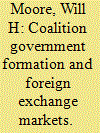

|
|
|
| 2 |
ID:
120825
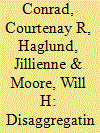

|
|
|
|
|
| Publication |
2013.
|
| Summary/Abstract |
The Ill-Treatment and Torture (ITT) Data Collection Project uses content analysis to measure allegations of government ill-treatment and torture made by Amnesty International (AI) from 1995 to 2005. ITT's country-year (CY) data quantify AI allegations of ill-treatment and torture at the country-year unit of observation and further across different responsible government agents and across different econo-socio-political groups of alleged victims. This paper introduces the Ill-Treatment and Torture country-year data, describes quantitative patterns likely to be of interest to researchers focused on the study of international non-governmental organizations (INGOs) and human rights, and suggests a number of theoretically motivated questions that can be explored using the ITT country-year data.
|
|
|
|
|
|
|
|
|
|
|
|
|
|
|
|
| 3 |
ID:
147838
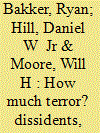

|
|
|
|
|
| Summary/Abstract |
Our knowledge of the set of concepts that influence the number of terror attacks experienced by different countries is rudimentary. Existing work on the incidence of terror focuses upon the structural characteristics of polities, economies, and societies, and fails to place competition between dissidents and states center stage. It also tends to treat terror as isolated from other tactics that dissident groups might use to pressure the state. This study addresses these shortcomings by placing government and dissident group behavior at the center of the analysis. Drawing on arguments from the larger literature on dissent and repression, we argue that government behavior and dissident behavior are likely to be more important determinants of terror attacks than structural factors. We scour the literature for existing arguments to round out our model specification, and evaluate hypotheses using Bayesian statistical techniques and a broad scope of relevant data. For many of our independent variables we construct indices using measurement models that are able to account for measurement error and missing data, resulting in a more comprehensive set of data than previous studies. The results demonstrate that measures of government and dissident behavior have more explanatory power than measures of the concepts that populate existing research.
|
|
|
|
|
|
|
|
|
|
|
|
|
|
|
|
| 4 |
ID:
098174


|
|
|
| 5 |
ID:
120867
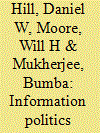

|
|
|
|
|
| Publication |
2013.
|
| Summary/Abstract |
''Information politics'' INGOs such as Amnesty International have incentives to maintain their credibility by carefully vetting information about rights abuses committed by governments. But they are also strategic actors that may inflate allegations of abuse to fulfill organizational imperatives. This raises an intriguing question: When are INGOs more likely to exaggerate their allegations? In answer to this question, we argue that news media reporting pressures INGOs to comment for organizational reasons, even if the information available to them is poor. On the other hand, higher numbers of domestic human rights NGOs increase the quality of available information, and INGOs will find more credible information provided about states as the winning coalition to the selectorate rises. Yet, an incentive to exaggerate allegations under certain conditions does not imply that INGOs will always do so. Indeed, there exists significant observed variation in INGO reports about government abuse. To test our hypotheses, we employ a zero-inflated ordered probit model with correlated errors that permits us to model an unobservable probability (the probability that the INGO exaggerates its allegations) and correct for potential bias. Results provide support for our hypotheses, and suggest that Amnesty International adheres to its credibility criterion, rarely succumbing to incentives to exaggerate abuse.
|
|
|
|
|
|
|
|
|
|
|
|
|
|
|
|
| 6 |
ID:
106253


|
|
|
|
|
| Publication |
2011.
|
| Summary/Abstract |
Although scholars have made considerable progress on a number of important research questions by relaxing assumptions commonly used to divide political science into subfields, rigid boundaries remain in some contexts. In this essay, we suggest that the assumption that international politics is characterized by anarchy whereas domestic politics is characterized by hierarchy continues to divide research on the conditions under which governments are constrained by courts, international or domestic. We contend that we will learn more about the process by which courts constrain governments, and do so more quickly, if we relax the assumption and recognize the substantial similarities between domestic and international research on this topic. We review four recent books that highlight contemporary theories of the extent to which domestic and international law binds states, and discuss whether a rigid boundary between international and domestic scholarship can be sustained on either theoretical or empirical grounds.
|
|
|
|
|
|
|
|
|
|
|
|
|
|
|
|
| 7 |
ID:
132357
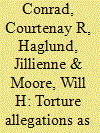

|
|
|
|
|
| Publication |
2014.
|
| Summary/Abstract |
The Ill-Treatment and Torture (ITT) Data Collection Project uses content analysis to measure a number of variables on more than 15,000 public allegations of government ill-treatment and torture made by Amnesty International (AI) from 1995 to 2005. The ITT specific allegation (SA) event data use the torture allegation as the unit of observation, thus permitting users to manipulate them for a wide variety of purposes. In this article, we introduce the ITT SA data. We first describe the key variables in the SA data and report a number of bivariate descriptive statistics to illustrate some of the research questions that might be usefully investigated with the data. We then discuss how we believe the ITT SA data can be used to study not only AI's naming and shaming behavior, but also states' (lack of) compliance with the United Nations Convention Against Torture (CAT). We conclude with an empirical analysis using the SA data that investigates the effect of domestic political institutions on formal complaints, investigations, and adjudication of torture allegations. We show that legislative checks are positively associated with complaints, investigations, and trials; elections and freedom of speech are positively associated with investigations and trials; and powerful judiciaries are associated only with investigations.
|
|
|
|
|
|
|
|
|
|
|
|
|
|
|
|
| 8 |
ID:
157580
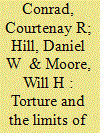

|
|
|
|
|
| Summary/Abstract |
What are the limits of democracy’s positive influence on human rights? In this article, we argue that contested elections and powerful courts provide leaders with different incentives with regard to hiding torture. Because government torture is generally targeted at individuals that voters find threatening, institutions that reflect public opinion – like electoral contestation – are associated with higher levels of government abuse that leave scars on the victim’s body. Other institutions – like powerful courts – protect the rights of political minorities. Leaders in countries with powerful courts prefer plausible deniability of rights violations and consequently employ higher levels of clean torture, which leaves no scars. We test our hypotheses using data from the Ill-Treatment and Torture (ITT) Data Collection Project that distinguish between Amnesty International (AI) allegations of scarring and clean torture. We employ an undercount negative binomial that accounts for AI’s (in)ability to obtain information about torture. The model assumes that some incidents of torture go unreported and allows the extent of underreporting to vary across countries/years. Estimates from the model yield considerable statistical and substantive support for our hypotheses.
|
|
|
|
|
|
|
|
|
|
|
|
|
|
|
|
| 9 |
ID:
079948


|
|
|
|
|
| Publication |
2007.
|
| Summary/Abstract |
common public perception in OECD countries suggests that refugees are mostly "economic migrants" in search of a better standard of living. Does the empirical record belie this belief? The authors explore that question within a rationalist approach using aggregate-level data that allow them to explore a variety of other covariates of the choice to seek refuge in one country relative to another. In addition to wages, they consider fear of persecution, culture, and the costs of relocation. The results are at odds with the "bogus refugees" image: the effect of average wages is mediated by proximity such that higher average wages are associated with fewer refugees, except among bordering countries. In addition, refugees seek asylum in neighboring countries, especially those at war with their own country or those experiencing a civil war. Those who seek refuge in countries other than their neighbors follow colonial ties
|
|
|
|
|
|
|
|
|
|
|
|
|
|
|
|
|
|
|
|
|